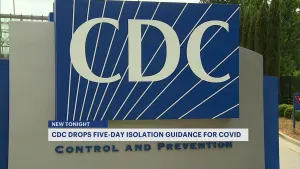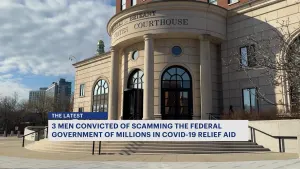More Stories
News 12's Senior Investigative Reporter Tara Rosenblum spoke exclusively with the co-founder of Tarrytown-based Regeneron about a breakthrough discovery that could help millions of COVID patients battle the most severe strains going forward.
While the demand for Regeneron's double-antibody cocktail has dropped dramatically following the decision by the Food and Drug Administration to limit its use due to concerns over its efficacy and the new COVID -19 strains, Dr. George Yancopoulos says he does not believe we are in the post-pandemic phase.
"I don't think we'll ever be in the post-pandemic stage. I mean, basically COVID has become what they call endemic. Just like the flu and like a number of other diseases, we're going to be fighting this for the rest probably of human eternity," says Yancopoulos.
Yancopoulos says he hopes the new discovery will be a game-changer for the roughly 10 million Americans whose immune systems won't respond to the current vaccines on the market.
"We've come up with a monoclonal antibody that looks like it's 1 in a million that has the ability to work against all of the known variants to date," he says. "We hope that this can be an important weapon that they can use protect themselves and to fight back."
"I don't think we'll ever be in the post-pandemic stage. I mean, basically COVID has become what they call endemic. Just like the flu and like a number of other diseases, we're going to be fighting this for the rest probably of human eternity," says Yancopoulos.
Yancopoulos says he hopes the new discovery will be a game-changer for the roughly 10 million Americans whose immune systems won't respond to the current vaccines on the market.
"We've come up with a monoclonal antibody that looks like it's 1 in a million that has the ability to work against all of the known variants to date," he says. "We hope that this can be an important weapon that they can use protect themselves and to fight back."
The treatment is entering clinical trials this summer and awaiting FDA approval, but Yancopoulos says he is extremely hopeful and grateful for his army of scientists at Regeneron as the battle against COVID now pushes into a fourth year.
He says - as most of the world's leading scientists do - that another pandemic is not only possible but probable, and that the nation's lack of preparedness for the next one is a full-blown emergency.
"We're not doing enough as a society. Think about it. We only invest about $30 billion to $40 billion a year to support academic research through the NIH, yet we've just seen that one pandemic like COVID causes trillions in damages. We have to recognize as a society that we have to up our game."
More from News 12
0:22

Cold Spring Village Hall closed due to COVID-19 surge and staff shortages

Hometown Heroes in the Hudson Valley
1:28

Medical experts recommend to still take precautions following CDC's revised COVID isolation guidelines
1:52

Judge: 3 men convicted in COVID-19 relief aid fraud
1:47

Wondrous Things store in Briarcliff Manor to close after 34 years; everything 25% off
0:28
